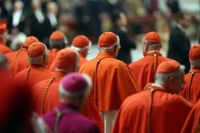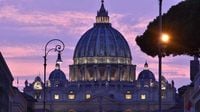As the Vatican prepares for the conclave to elect the 267th Pope, speculation is rife regarding the name the new leader of the Catholic Church will choose. The conclave begins on Wednesday, May 7, 2025, with a record number of 133 cardinal electors participating, hailing from 71 countries. This election is of immense interest to the 1.4 billion Catholics worldwide, who are eager not only to learn the identity of the new Pope but also the name he will take.
Upon being elected, the new Bishop of Rome will respond to the Latin question, "Quo nomine vis vocari?" (What name do you want to be called?). Historically, popes have often chosen traditional names such as Pius, Gregory, John, Benedict, Innocent, Leo, and Clement. However, Vatican experts believe it is highly unlikely that the new Pope will choose the name Francis II, following the legacy of Pope Francis, who surprised the world in 2013 by adopting the name Francis after St. Francis of Assisi.
Interestingly, Pope Francis once mentioned the name "John XXIV" when discussing his potential successor during a flight back from Mongolia in September 2023. This sparked discussions among Vatican commentators about whether the next Pope might opt for the name John, which has a rich history within the papacy.
In a recent discussion, Professor Cezary Kościelniak from Adam Mickiewicz University pointed out that there are three potential political and pastoral lines that could influence the choice of the new Pope. The first is a continuation of Pope Francis's thoughts, informally dubbed as the candidate Francis II. The second perspective leans towards a centrist-conservative approach, potentially favoring names like John Paul III or Benedict XVII. Lastly, he mentioned a diplomatic option that would echo the policies of John XXIII, suggesting the name John XXIV.
The preparations for the conclave include the tailoring of the Pope's attire by 86-year-old tailor Raniero Mancinelli, who has been crafting garments for clergy for 70 years. Mancinelli has prepared cassocks in three sizes, along with seven pairs of shoes and a red mucet, a type of cape that is part of the papal outfit. Notably, Pope Francis did not wear the mucet during his election in 2013.
The conclave itself will commence at 4:30 PM on May 7, when the doors of the Sistine Chapel will close, and the cardinal electors will begin their voting process. Vatican spokesman Matteo Bruni indicated that the first smoke signal, indicating the result of the vote, will not emerge before 7 PM. Starting Thursday, there will be two votes in the morning and two in the afternoon, with white smoke signaling a successful election and black smoke indicating no decision has been reached.
For the election, a two-thirds majority is required, which, with 133 electors, translates to 89 votes. The voting process is steeped in tradition, with each cardinal casting their vote in secrecy. They will write their chosen candidate's name on a ballot, which is then placed in a ballot box. The final results will be announced to the world via smoke signals from the chapel's chimney.
Experts predict that the conclave may be relatively short, with the possibility of a new Pope being declared by Thursday evening, May 8. However, less optimistic forecasts suggest it could extend into Friday, May 9. Historically, conclaves have not lasted longer than five days, and the last time an election extended beyond that was in 1740.
As the cardinals gather, discussions are ongoing about the potential candidates for the papacy. Among those mentioned are Cardinal Pietro Parolin from Italy, who serves as the Secretary of State, and Cardinal Luis Antonio Tagle from the Philippines, often referred to as the "Francis of Asia." Other notable names include Cardinal Matteo Zuppi, Cardinal Mario Grech, and Cardinal Peter Erdo, who is favored by the conservative faction within the Church.
The atmosphere surrounding the conclave is one of anticipation and speculation. With Pope Francis having appointed 110 of the 135 cardinal electors, many believe that the new Pope will likely continue some of the policies and approaches of his predecessor. Yet, the cardinals may also seek someone who can stabilize the Church after the revolutionary and unpredictable tenure of Pope Francis.
As the world watches closely, the question remains: what name will the new Pope choose, and what direction will he take the Catholic Church in the years to come? The answer will unfold in the coming days as the conclave progresses, and the faithful await the announcement of "Habemus Papam"—"We have a Pope."


